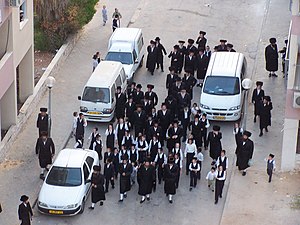Driving on Shabbat
According to halacha, the operation of a motor vehicle constitutes multiple violations of the prohibited activities on Shabbat (the Jewish Sabbath).
According to both Orthodox and non-Orthodox Jews, driving on Shabbat is permitted (and required) when necessary to save a human life (pikuach nefesh).
While riding an animal, the primary ancient form of transportation, during Shabbat is rabbinically prohibited, the operation of an automobile is considered a direct violation of Torah law due to the burning of fuel, among other issues.
Additionally, those who do drive frequently travel greater distances than those who walk, thereby leaving the boundaries of the local eruv and violating those Shabbat laws pertaining to traveling beyond the "boundary distance" (techum shabbat) and transferring between a public and private domain (hotza'ah).
In Orthodox Judaism, committing a sin in order to fulfill a mitzvah other than saving a human life (Pikuach Nefesh) is not considered Halachically acceptable, and if one cannot reach a synagogue by walking, it is preferable to pray at home.
Parking and turning off the vehicle may not be permitted under these circumstances either, although moving the car out of the emergency lane is viewed with more leniency.
The Conservative Movement examined the issue of driving on Shabbat during the 1950s and decided to allow limited use of the automobile strictly for the purpose of attending synagogue services.
[7] The need to reexamine the ruling came in response to demographic shifts, as many Jews were moving into suburban communities and no longer in walking distance of their synagogues.
In accordance with these rulings, driving is not permitted for any other reason, including attendance at a social function at the synagogue that has no prayer involved (such as a Bar or Bat Mitzvah reception), as doing so is viewed as serving man and not God.
These include the handling of one's wallet or purse (a muktzah item), since it contains one's driver's license; the purchase of gasoline, a business transaction; and the distance of travel, which usually extends outside the boundaries of an eruv.
If the relative is not coherent, others may be required to provide authorization for life-saving treatment, and the mere presence of visitors can have a salutary effect on patients.
[citation needed] When a medical issue occurs that is not considered life-threatening, but is of discomfort to a person, or may endanger one's limb, it is acceptable to ask a gentile if available to drive the patient to a hospital or physician.

